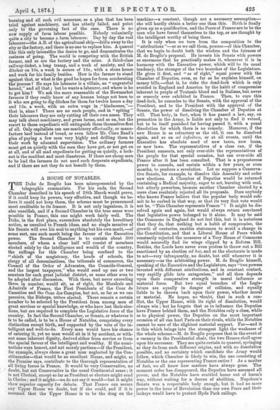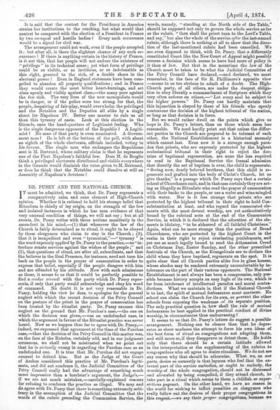A HOUSE OF NOTABLES. T HE Duke de Broglie has been
misrepresented by the telegraphic snmmarists. For his ends, the Second Chamber described in his speech of 28th March would prove, if it could keep its powers, very effective, and though we be- lieve it could not keep them, the scheme must be pronounced most creditable to its framer. It is not only ingenious, it is also unselfish, and if a Second Chamber in the true sense were possible in France, this one might work fairly well. The Duke, in the first place, surrenders absolutely the hereditary notion, as unsuited to French ideas, and no single member of his Senate will owe his seat to anything but his own merit,—of some sort, one such merit being the favour of the Executive power. The Second Chamber is to contain about 300 members, of whom a clear half will consist of members elected solely by the intelligence and wealth of the country, the suffrage for this Chamber being confined to the "chiefs of the magistracy, the heads of schools, the clergy of all denominations, the tribunals of commerce, the Council of the Order of Advocates, the Councils-General, and the largest taxpayers," who would send up one or two senators for each great judicial district, or some other area to be adopted after discussion. With these, but never exceeding them. in number, would sit, as of right, the Marshals and Admirals of France, the First Presidents of the Cour de Caseation and fhb Cour des Comptes, but not, so far as we can perceive, the Bishops, union elected. There remain a certain number to be selected by the President from among men of great services or special knowledge, or who have lost their elec- tions, but are required to complete the Legislative force of the country. In fact the Second Chamber, or Senate, or whatever it is to be called, is to be a House of Notables, comprising every distinction except birth, and supported by the vote of the in- telligent and well-to-do. Every man would have his chance of entering it, yet no man would sit in it by accident, or with- out some inherent dignity, derived either from service or from the special favour of the intelligent and wealthy. If the nomi- nations were honest, and not merely partisan—if the President, for example, always chose a great man neglected by the Con- stituencies—that would be an excellent House, and might, as the Premier says, contribute to the thorough representation of all living forces in France. It would be very Conservative, no doubt, bat not Conservative in the usual Continental sense ; it is not Clerical, except so far as President or electors might send in Clerics ; and it might—we do not say it would—but it might show superior capacity for debate. That France can secure any Upper House we doubt, but if she could, and if it is assumed that the Upper House is to be the drag on the machine—a constant, though not a necessary assumption— she will hardly obtain a better one than this. Birth is finally given up as a qualification, and the Peers of France are to be the men who have forced themselves to the top, or are thought by the intelligent worthy of being there.
It is only when we turn from the composition to the "attributions "—or as we call them, powers—of this Chamber, that we begin to doubt both the wisdom and the fairness of M. de Broglie's proposal. He invests his Senate with powers so enormous that he practically makes it, whenever it is in harmony with the Executive power, which will be its usual tendency, the stronger of the two branches of the Legislature. He gives it first, and "as of right," equal power with the Chamber of Deputies, even, so far as he explains himself, on money bills,—that is, he risks the dead-lock which is only avoided in England and America by the habit of compromise inherent in people of Teutonic blood and in Italians, but never or scarcely ever exhibited in France. Then, to cure this dead-lock, he concedes to the Senate, with the approval of the President, and to the President with the approval of the Senate, the power of dissolving the Chamber of Deputies at will. That body, in fact, when it has passed a law, say, on promotion in the Army, is liable not only to find it vetoed, but to be itself punished for having passed it, with a penal dissolution for which there is no remedy. Moreover, if the new House is as refractory as the old, it can be dissolved again, and so on ad infinitum, or at all events, until the Executive has absolute need of new taxes, new loans, or new laws. The representatives of a class can, if the President consents, not only over-ride the representatives of the people for that special occasion, but can over-ride all France after it hag been consulted. That is a preposterous power to concede, and certain within a few years, or even months, to produce a revolution. Let us suppose a Conserva- tive Senate, for example, to dissolve this Assembly and order new elections. A Chamber of Deputies would be returned containing a Radical majority, eager to act, burning with zeal, but utterly powerless, because another Chamber elected by a mere class resolutely rejected all its proposals. Does anybody who knows France believe that the popular body would sub- mit to be curbed in that way, or that its very first vote would not be, "This Chamber represents France " ? It might be dis- solved again and again, but would always return convinced that legislative power belonged to it alone. It may be said the Commons in England do not feel this, but it is notorious that they do, that nothing but a habit of compromise, the growth of centuries, enables statesmen to avoid a change in the Constitution, and that a Liberal House of Peers which constantly rejected the measures of a Tory House of Commons would assuredly find its wings clipped by a Reform Bill. Besides, the Lords here never even profess to throw out a Bill sanctioned by an election ad hoc, and so the electorate is made to act—very infrequently, no doubt, but still whenever it is necessary—as the arbitrating power. M. de Broglie himself, speaking of the Executive and the Legislature, says "two powers invested with different attributions, and in constant contact, very rapidly glide into antagonism," and all then depends upon their comparative strength in moral influence or material force. But two equal branches of the Legis- lature are equally in danger of collision, and equally liable to be thrown back upon their power, whether moral or material. Ile hopes, no •doubt, that in such a con- flict, the Upper House, with its right of dissolution, would always win ; but he forgets that as to influence the Deputies have France behind them, and the Notables only a class, while as to physical power, the Deputies on the most important occasion of all can hurl Paris on their rivals, while the Notables cannot be sure of the slightest material support. For—and it is this which brings into the strongest light the weakness of the whole scheme—M. de Broglie proposes that in the event of a vacancy in the Presidential chair, the two Houses shall agree upon his successor. They are quite certain to quarrel, springing as they do from such different origins, and with no dissolution possible. and no certainty which candidate the Army would follow, which Chamber is likely to win, the one consisting of Notables or the one representing France entire ? As a matter of fact, we all know how matters have always gone. The moment order has disappeared, the Deputies have assumed all power, and the Notables have scuttled home out of harm's way, without waiting for a decree of abolition. Napoleon's Senate was a respectable body enough, but it had no more power in the hour of Revolution than our own Peers and their lackeys would have to protect Hyde Park railings.
It is said that the contest for the Presidency in America strains her institutions to the cracking, but what would that contest be compared with the election of a President in France by two co-equal and hostile bodies ? Every such occurrence would be a signal for civil war.
The arrangement could not work, even if the people accepted it ; but after all, is there the slightest chance of any such oc- currence? If there is anything certain in the history of France, is it not this, that her people will not endure the existence of " privilege " in its technical sense ; yet what form of privilege could be so visible, or so invidious, or so indefensible as this right, granted to the rich, of a double share in the electoral power ? Even in England statesmen have been com- pelled to abandon all property qualifications ; and in France they would create the most bitter heart-burnings, and set class openly and visibly against class,—the many poor against the few rich. The very lives of the new monopolists would be in danger, or if the police were too strong for that, the people, despairing of fair-play, would overwhelm the privileged and the Notables and the Deputies all alike by a single shout for Napoleon IV. Better one master to rule us all than this tyranny of caste. Look at this election in the Gironde, once the head-quarters of Legitimist feeling. Who is the single dangerous opponent of the Republic ? A Legiti- mist? No man of that party is even nominated. A Govern- ment man ? He is left at the bottom of the poll, with about an eighth of the whole electorate, officials included, voting in his favour. The single man who endangers the Republican seat is M. Bertrand, whose solitary claim is that he represents one of the First Napoleon's faithful few. Does M. de Broglie think a privileged electorate distributed and visible everywhere in the Gironde would diminish the votes given to M. Bertrand, or does he think that the Notables could dissolve at will an Assembly of Napoleon's devotees ?



































 Previous page
Previous page